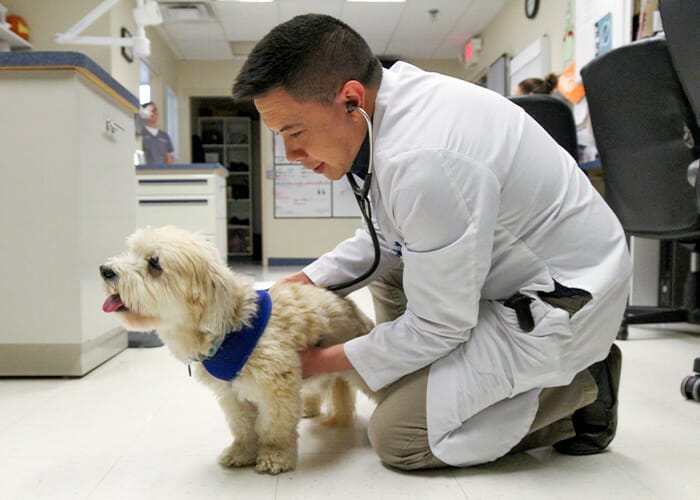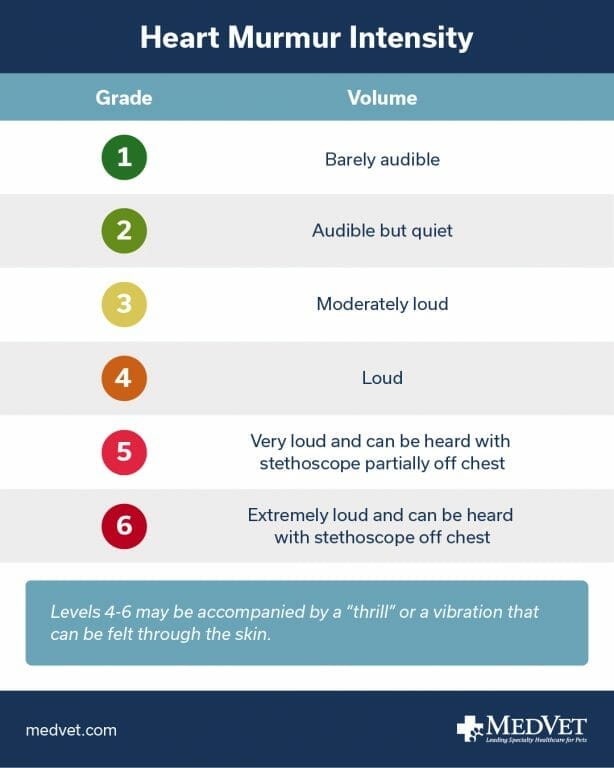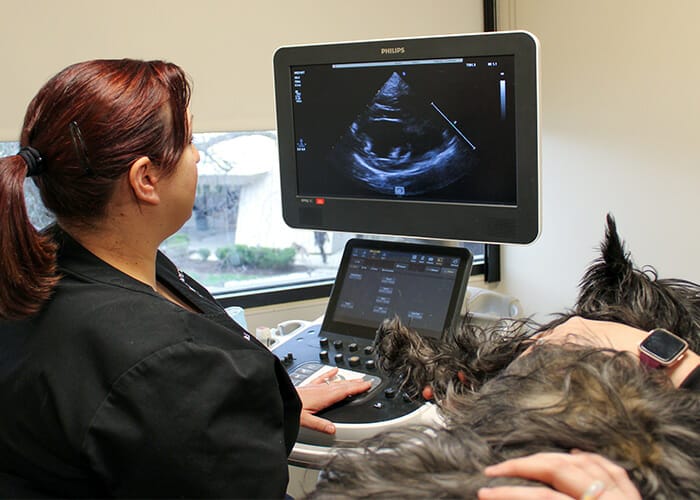
The heart is one of the hardest-working organs in the body. It contracts thousands of times a day to move blood and deliver oxygen and nutrients throughout the body. An adult dog’s heart beats between 60 and 140 times per minute. For a cat, it is typically between 140-180 beats per minute. When listening to a normal heartbeat, there are two sounds – a lub and a dub. The valves closing during the heart cycle causes those sounds. If there are problems with the heart, you could hear something besides a lub and dub.
What is a heart murmur?
A heart murmur is an abnormal whooshing or swishing sound caused by turbulent blood flow through the heart or the surrounding large blood vessels. A murmur is just a sound, not a disease. It can be nothing, or it can be sign that there is something effecting how the heart works. Think of it like an odd sound you might hear in your car. Sometimes you hear a strange sound and then it disappears (usually before you can even get it to your mechanic). Other times, the strange sound helps your mechanic find something wrong with your car that needs to be fixed.
Some murmurs are known as flow or innocent. These do not have an impact on your pet’s health. It’s like those car sounds that mysteriously come and go without causing any issues. These innocent murmurs can show up in puppies and kittens when they are going through periods of growth.
Other murmurs are pathologic, meaning an underlying disease or issue is the cause. In this case, the murmur is the warning sign that something bigger is going on, and your veterinarian will work to determine the cause of the sound.
How do you find a heart murmur?
Heart murmurs are found by listening to your pet’s heart with a stethoscope and they don’t all sound the same. Your veterinarian will listen for:
- Loudness – The amount of turbulence taking place determines how loud it is.
- Location – Where around the chest the murmur can be heard the loudest.
- Timing – It’s important to determine when the murmur happens during the heart contraction.
- Length – Some murmurs last longer through the heart cycle than others.
Murmurs are rated by their intensity from Grade 1 to 6. A Grade 1 is very quiet and may only be heard some of the time or in a single location. On the other hand, a Grade 6 is much louder, may be heard regularly and throughout the chest area, and may even be felt if you put your hand on your pet’s chest.

What are some likely causes of a murmur in my pet?
Structural issues can include things like a leaky heart valve, narrowing of valves or blood vessels, changes to the thickness of the heart muscle, or a hole in the heart or vessels. Some pets are born with these structural issues, congenital heart defects, while others develop over time. Just like in humans, as pets age, they may develop issues with their heart that didn’t exist before. So, a new murmur doesn’t necessarily mean your veterinarian missed an earlier diagnosis.
In cats, the most common structural heart diseases that develop over time are what’s known as cardiomyopathies or diseases of the heart muscle. Hypertrophic cardiomyopathy (HCM) is a common condition where the muscle of the main chamber of the heart becomes thicker than normal.
For dogs, the most common structural heart diseases are degenerative valve disease (usually in aging, small breeds) and diseases of the heart muscle. Dilated cardiomyopathy, where the heart muscle becomes thinner, is a common disease in larger breed dogs. In this condition, a dog has a harder time generating the necessary pressure to pump blood through the body.
We discovered a heart murmur in my pet; now what?
When a heart murmur is discovered, it’s time for some investigation to figure out what, if anything, is causing the murmur. Your veterinarian will complete a thorough physical examination that will include asking you questions about your pet’s overall wellness. Pets with structural heart disease may display other symptoms such as lethargy, decreased appetite, weight loss, or breathing problems. However, some pets do not have other symptoms at all.
To determine the underlying cause of a murmur, diagnostic testing must be completed. It could be a caused by a structural issue with the heart. However, a variety of other non-cardiac issues such as anemia, fever, or conditions such as pregnancy or a pet being overweight could be the cause.
The gold standard for diagnosing the cause of a pet’s heart murmur is a complete echocardiogram by a board-certified Veterinary Cardiologist. An echocardiogram is an ultrasound of the heart that gives a clear picture of the structure, pumping and relaxation function, and blood flow through the heart valves and large vessels. This painless, non-invasive procedure is usually completed without the need for sedation.
Other testing may include chest X-rays, blood pressure measurements, blood tests, or an electrocardiogram (also known as an ECG or EKG) to help analyze the heart’s rhythm. These tests are complementary to an echocardiogram.

How will my pet be treated?
Treatment depends on what your veterinarian finds during testing. Some pets have mild or no underlying structural problems and don’t require any immediate treatment. In these cases, your veterinarian will monitor your pet for any changes. For pets with severe heart disease or structural issues, the focus for treatment will address that specific condition. This may include medications or surgical options depending on the issue.
Regular checkups where your veterinarian listens to your pet’s heart are key to early detection of any cardiac issues. Although discovering a heart murmur in your pet can be scary, your veterinarian will be there to help guide you through the process of finding and treating the underlying cause. In addition, including a cardiology specialist on your pet’s care team can help ensure the best care for your pet. Our MedVet Cardiologists work in partnership with you and your family veterinarian to provide the best treatment for your pet.